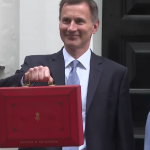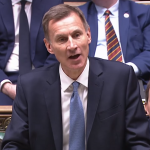George Osborne: Move over Keynes – The Shock Axeman Cometh
This is a cross post of a piece I was asked to write for the excellent folks at TMPonline.org
According to the Sunday Times Rich List, the richest 1,000 in Britain have seen their wealth increase by 30 per cent in the last year: £77bn – half the annual deficit.
On Tuesday, George Osborne will launch a radical, economic experiment. He will begin a process of attempting to cut public spending more than has ever been tried before in the hope that this will cut the government’s deficit.
The rational he gives varies, but it usually Tories say something like: “Our deficit is massive – we are spending more than we can afford, so we must cut back a lot”
So, first, is our deficit that bad?
No. The Tories like to talk a lot about how much more the government spent last year than they took in taxes. This is rather like attempting to establish how rich someone is by looking at their current account, without also checking to see if they have any savings, or assets.
And the truth is, that when we look at the debt to GDP ratio – a much more appropriate measure, we have one of the lowest debts in either the EU, or the G8 (a map here). But despite not having anything like their debts, we are going much further than any of them in cutting jobs and public services.
Similarly, even if this debt is substantial who’s it owed to? Well, the vast majority of it, is to us. Whereas many countries may be suffering a sovereign debt crisis, as foreign entities buy up their debts, 80% of UK debts are owed to the people of the UK. As even former Thatcherites like Paul Segal recognise, in this country, the government’s debts, when looked from the other side of the balance sheet, are our pensions. Even if interest rates do go up slightly (though the evidence that they would is dubious – Italy, with a much lower credit rating barely pays more interest) – all this means is that our pension funds get fatter.
But let’s imagine if we did have the massive problem the Tories say we had, should we really cut jobs in a recession? We tried that in the 1930s. It led to the Great Depression. As the economist John Maynard Keynes taught us, if we take lots of jobs away, people will spend less, so more will lose their jobs, which means there will be fewer people paying taxes, and the deficit may well go up. Put another way, there are two ways that money comes into an economy – from bank lending, or government spending. The recession has led to credit drying up – less bank lending. So we need more government spending to make up for it.
Tories love to talk about wasteful public services, but the truth is that the biggest waste in our economy is not public spending, it’s unemployment – and their measures look likely to make things much worse.
Cutting public spending in a recession to pay off your debts is like a fisherwoman selling her rod to pay off her loans, rather than waiting till she catches some fish. As one of Britain’s top economists recently said, it’s rather like going to the doctor with a cold, and they say they can cure you – by cutting off your legs – it won’t do what you hope, but it will give you a new problem, which is much bigger.
So, why are they doing it? Well, Nobel winning economists Joseph Stiglitz and Paul Krugman and others such as the man in the Bank of England who predicted the crisis David Blanchflower tell us that “this is not about economics – it’s about dogma”
Because if the Tories really wanted to cut the deficit, why are they promising to cut taxes for mega-corporations, married couples, and dead rich people? Why are they refusing to include the £100 billion Trident replacement in their defense review?
A Treasury spokesman allowed the veil to slip recently:
“Anyone who thinks the spending review is just about saving money is missing the point. This is a once-in-a-generation opportunity to transform the way that government works.”
Conservatives consistently undervalue the importance of public services. They don’t understand how the impacts of public spending cuts effect ordinary people – and as a result, the economy. Because the pain of these cuts is not falling on the people who voted for them. Because they opposed the introduction of every one of the services they are now scrapping, Because the recession is not the reason for the cuts, but the smokescreen.
In her excellent book, The Shock Doctrine, Naomi Klein gave examples from all around the world of how right wing governments use disasters, whether natural or economic, to force through radical neo-liberal agendas while people are in shock: because we understand that the recession is a major event, we are more likely to accept a radical response. Because those who control the means of disseminating ideas are wealthy, they have similar interests. And this means that they are able to soften us up to massive cuts to the public services it took our parents and grandparents at least 100 years to win.
The pain of these cuts is falling hardest on the young, and the poor – and anyone who depends most on public services. These cuts will hit nursery schools, hindering single parents of young children from going to work. They will hit youth job schemes, so a generation will be lost to unemployment. They will hit benefits, so that once they take your job away from you, you have little chance of picking yourself back up.
But because they don’t understand the value of our jobs and public services, they don’t understand how hard we will fight to protect them.
Because when the Tories tried to stop women getting the vote, people in this country came together and demanded it. When the Tories introduced the poll tax, people stood up and refused to sit down until they were heard. And now that they are using the recession as a smokescreen to take away public services it took our parents a century to win, we can work together again, and history shows us, we can win.
But there is another important question we need to ask. What is it that we are fighting for? Do we simply want to re-inflate the same old economy? The right wing looks likely to succeed in forcing through a mass scale privatisation of Britain in the shadow of a recession stemming from the failure of the private sector. They will have done so because they had clear ideas and a plan for how to secure them. If progressives in Britain are going to defeat them, we need to learn that lesson, because otherwise we will be fighting to defend the unequal, polluting, exploitative, corporatist, Britain of 2006 that was entirely dependent on the financial sector, while should be trying to secure a better future – because no progressive movement ever won by aiming for the past.
Visit our campaign website: www.noshockdoctrine.org.uk




I believe George Osborne will prove himself. He has been very passionate about meeting his commitments.
It is advisable to conduct thorough research in coming up a SEO plan. There’s nothing wrong with seeking professional help.
Martin –
I agree that we should be cutting those bits of spending. However, I think the money should be re-allocated into spending elsewhere, rather than taking the cash out of the economy. This is convenient – big asset based projects mean spending money on lumps of stuff, stimulous spending should ideally be on labour intensive projects.
There are two specific cuts I am in favour of – cutting defence spending and cutting road building. These were also in the Green Party manifesto. I’m a bit worried that these important cuts will be forgotten if the message is the overly broad “don’t cut public spending”.